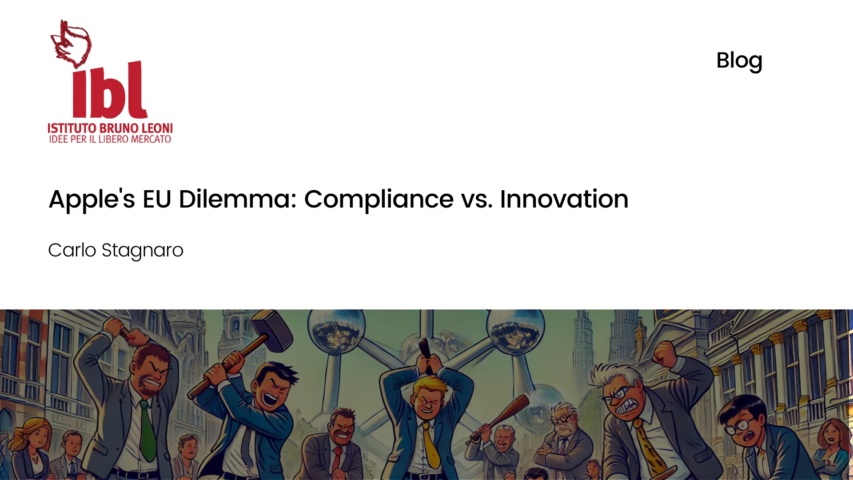Apple’s EU Dilemma: Compliance vs. Innovation

Apple's EU Dilemma: Compliance vs. Innovation
Carlo Stagnaro // 28 June 2024
The European Commission has made the first move in the great game of digital regulation. To demonstrate that its newly established Digital Markets Act (DMA) serves a purpose, the European Commission had to sanction violators. And naturally, it decided to go after the biggest player of them all – Apple. Brussels has published the results of a preliminary investigation, according to which the Cupertino company allegedly violates certain rules of the DMA relating to the obligations of the so-called ‘gatekeepers’ – the six largest online platforms in the world, almost all of which are American. These companies are: Alphabet (Google’s parent company), Amazon, Apple, ByteDance (that operates TikTok), Meta (owner of Facebook, Instagram and Whatsapp), and Microsoft.
In particular, Apple allegedly imposed constraints on app developers preventing them from directing users to promotions outside its App Store. One of the cornerstones of the DMA, in fact, is that any ecosystem must be open, which is contrary to Apple’s policy of having as ‘closed’ a system as possible to protect the security of its users.
There is the question of merit and the other, in some ways more important, question of method. Where merit is concerned, the DMA assumes that competition can only occur if all companies have the same business model (we discussed this in Stagnaro and Turillazzi, 2022). Therefore, all operators must have directly comparable practices and products. This approach assumes that individuals are incapable of choosing between an environment that is more open (and thus structurally more pluralistic, but also exposed to greater risks) and one that is not and that gives a greater value to online security. It overlooks the possibility that this very difference could influence users’ choice of one operator over another. Nor does it seem to matter to the European Commission that Apple serves a slice of the market that, while significant, is a minority (around 32 per cent in Europe). It also does not seem to matter in this analysis that – in a largely duopolistic context – a diversity of business models and relative value propositions could serve as a very effective bulwark against implicit forms of collusion. We shall see how the case develops. Regardless of the legal consequences of the application of the DMA, there has already been one fallout: Apple has declared that it will not make certain new functionalities available in Europe for fear that they too may be in conflict with the new rules.
Here, we come to the question of method. Apple is not the first among the big tech companies to design a different (and probably penalising) trajectory for Europe than for the rest of the world. A few months ago, Meta rolled out subscription-based ad-free versions of Facebook and Instagram services for those who do not wish to see advertisements (while the free version remains available for those who accept them). How sustainable and justifiable is this rollout of different strategies in Europe and the rest of the world? Meta has chosen to levy the cost of compliance on users; while Apple aims to simply restrict access to its innovations for the European public. European institutions are perfectly aware of this, and not only do they not seem to be concerned about it, but they even boast about it. European Commissioner for Internal Market Thierry Breton’s comment is emblematic: “Act different should be their new slogan. For too long Apple has been squeezing out innovative companies — denying consumers new opportunities & choices. Today we are taking further steps to ensure AppStore & iOS comply with DMA”.
Everyone has obviously to comply with the law. But policymakers (who make the laws) and voters (who delegate policymakers to create laws) should ask themselves whether the end result of such rules is desirable and whether the means is proportionate. The impression from this first application of the DMA is that the end result is undesirable and the means, disproportionate. Before and apart from the inevitable litigation, Europeans should ask themselves whether they are cutting the bridges between the EU and digital innovation, which European politicians vigorously invoke in words but fight in deeds.
This article was originally published by Istituto Bruno Leoni in Italian .
EPICENTER publications and contributions from our member think tanks are designed to promote the discussion of economic issues and the role of markets in solving economic and social problems. As with all EPICENTER publications, the views expressed here are those of the author and not EPICENTER or its member think tanks (which have no corporate view).



